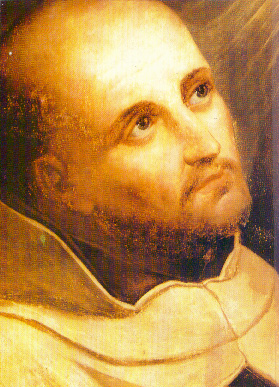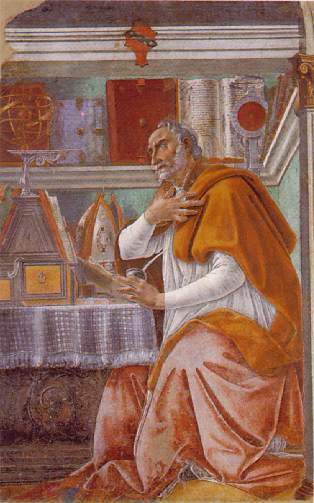
St John of the Cross, Doctor of the Church, writer of 'The Dark Night of the Soul', and lover of the Latin Mass. When St Teresa of Avila asked which Mass was his favourite, he said, "The Latin One" and went back to his cell.
As a newcomer to the Traditional Latin Mass, the most surprising thing I find is that I never really run out of writing material, because new thoughts creep into my head that would perhaps never surface during or after a Novus Ordu Mass. This must have something to do with its riches and the opportunity it affords to us to experience more deeply the Mystery of the Faith.
The most striking aspect of the Tridentine Mass is that in the communicant it seems to teach an interior 'poverty of spirit', which Our Lord Himself announced as a chief 'blessing' in the Beatitudes. The silence, the experience in a kind of spiritual desert, full of our cactuses which we have gathered in from the World, the lack of constant noise, the solemnity, the privacy and the entire mood created by the actions and rubrics followed by the Priest seem to foster an interior reflection and search for God. It is interesting. Pope Benedict XVI encourages TLM possibly for just this very reason, because it is not in loud singing, loud vocalisation and communal action that God is to be found, but in the silence of our hearts, in realising our poverty, our need, our spiritual hunger and thirst to know God, who has, as St Augustine said, 'made us for' Himself, and our 'hearts are restless until they rest' in Him.

St Augustine, Father of the Church, writer of 'City of God' and 'Confessions' and lover of the Latin Mass. Loved the Latin Mass so much he wrote all his books in Latin and made a point of saying stuff in Latin a lot.
It may be, in a sense, that this poverty of spirit is what puts many people off the Tridentine Mass, because in a sense, it is questionable whether we want it. Do we want to enter into the silence of our hearts and look within at our souls and peer into the darkness, or would we rather the Mass were more 'entertaining', more sensory, more fleeting, and something that could mask the wounds and ailments in our souls? This is, I think, why it provokes some to anger, because if we really go there, we are confronting parts of ourselves which we really do not like. In the Latin Mass in the silence, I am confronting my pride, my lust, my restlessness, my egoism, my guilt, and seeing my need for God. It is seemingly more apparent that in some parish churches, our true spiritual hunger is being whitewashed by 'elevator music' which is designed to make us feel good, put us at ease, make us feel comfortable. Yet, still, we are restless and anything but comfortable. The Latin Mass offers the exact opposite of this...and that is its greatest strength...the humility that it encourages within those present, including of course, the Priest.
This same 'poverty of spirit' we experience in the Mass becomes then a 'search for the Face of God' which prepares us and leads us into a deeper appreciation for God made manifest on the Altar and for Holy Communion, which as Catholics we believe is the highest form of worship that can take place on the face of the Earth. It is almost as if the Lord is preparing our hearts in the Latin Mass for the reception of Himself. Our hearts are like soil, which He weeds, tills, rakes over, and levels over, before planting His Very Self, His Body and Blood, His Soul and Divinity, His Humanity because He knows that in the Mass, the poverty of spirit has led us to realise our hunger for Him. The earth in our hearts cries our for Him and He then plants His seed within our hearts which then in the silence and given space and time will flower and bare fruit 'in due season'.

St Francis of Assisi, Founder of the Franciscans and lover of the Latin Mass. Reported to have said, "Preach the Gospel at all times, if necessary use words, but make sure you go to the Latin Mass. It is splendid."
In this same Communion with God, we enter into an ever deeper communion with all of Heaven, with the Angels and Saints, the Church Triumphant and the Church Suffering, and of course, with each other, the Church Militant. The fruits of a deeper, richer, more intimate communion to be discovered in the Latin Mass are, I think, to be seen afterwards when we meet as members of the Body of Christ, when we talk, share thoughts and words over a drink in the Presbytery. Things are a little different from an average Mass afterwards.
I believe this has something to do with the appreciation, the gratitude, the poverty of spirit, the act of receiving God, kneeling, rather than taking, the intimacy we have been given with God in the Mass, the fact that we have, if only for a short time, entered into a mystery so great it is beyond our comprehension, the fact that we have paused and reflected upon the wonder of what God has given us and what He has done for us.
The Latin Mass inspires humility, born from poverty of spirit and reverence for the Sacred and the Divine, for the one Who was born of the Virgin Mary, Who died for us and Who was raised in Glory on the third day. This leads us to an ever deeper communion with God and an ever deeper communion with each other.
The great mystics of the Church talked of the 'dark night of the soul', spiritual dryness and the spirituality of the desert, without which, perhaps, it is unlikely that our spiritual life is based upon the reality of the Faith which we have received. If we are not going through the 'dark night' and finding glimpses of the Divine in our darkness, and Mass is covering up or masking the reality of the 'dark night', be it through music or volume, then it has to be asked whether that kind of a Mass, though still giving us Christ in the Holy Eucharist, is, by masking our own condition, robbing us of the depths and riches of the holiness and sanctity that God has given the Most Holy Sacrifice of the Mass.

St Teresa of Avila, Doctor of the Church and writer of 'The Interior Castle' and her autobiography called, 'Why I love the Latin Mass: A defence of the Latin Mass to those who say, "That Was Not My Mass!" Okay, okay, 'The Life of Teresa of Jesus.'
While detractors in the Church and opponents of TLM most certainly exist and do complain that it is like something 'alien' to them, this is actually why I like it. Every now and then, I get sick of looking into a mirror. The detractors, be they within the parish church or the offices of The Tablet, will doubtless continue to snipe at the brave priests offering TLM to the Faithful, as the Holy Father wishes.
Yet, the fact remains that if we are going to Mass seeking anything other than the Face of God, if we are seeking music, our own egoism, a 'community gathering', a distraction from God, a visual or aural sensory experience then it is a wonder why we go at all. We may just as well have missed Mass and gone to the pub at opening time and waited there until the Faithful arrive afterwards for a drink. God is being made truly present on the Altar. This is the most important, most holy, most sacred event that takes place on Earth. It is vitally important, as Pope Benedict XVI has said, that it be treated as such! The King of Kings just walked into the room. Let's give Him a little respect.


2 comments:
Well put as usual Laurence. One thing which struck me this evening was that I think the men outnumbered the women this time.
I forgot it was on tonight, silly me. Was it a good turnout?
Post a Comment